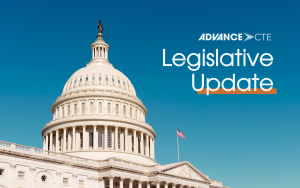
Much has happened over the last two weeks, with Congressional Republicans successfully passing and the President signing a long-anticipated domestic legislative package via the budget reconciliation process. Elsewhere, the Trump administration has taken new steps to withhold Congressionally enacted education funding while more recently advancing new interpretative guidance that has implications for postsecondary Career Technical Education and dual and concurrent enrollment programs.
Trump Administration Advances New Legal Interpretation Impacting Postsecondary Institutions
This week, the U.S. Department of Education (ED) published a Notice of Interpretation related to the Personal Responsibility and Work Opportunity Reconciliation Act (PRWORA). Similar guidance documents were issued for workforce programs overseen by the U.S. Department of Labor (DOL) and other agencies and programs throughout the federal government. The primary goal of these efforts appears to be eliminating pre-existing exemptions under PRWORA, so that certain public benefit programs are now subject to broader legal restrictions that prohibit providing these services to undocumented immigrants.
The notice comes in response to the President’s February 19, 2025, Executive Order (EO) 14218, “Ending Taxpayer Subsidization of Open Borders.” The ED notice restates existing legal requirements governing the availability of “public benefits” for U.S. citizens and non-exempt nonresidents, while introducing a new legal interpretation that many postsecondary education programs—including those funded by the Carl D. Perkins Career and Technical Education Act (Perkins V)—are also “public benefits” and therefore subject to greater limitations regarding access. The notice appears to argue that dual and concurrent enrollment programs are also a “public benefit” and therefore subject to these limitations as well.
Advance CTE is continuing to analyze this regulatory proposal, which does not include an opportunity for public comment, to understand additional potential implications for the Career Technical Education (CTE) community.
Trump Administration Withholds Education Funds
Less than a day before funds were due to be distributed, the Trump administration announced it was withholding approximately $7 billion in previously appropriated federal education funding. Congress approved these funds under the continuing resolution (CR) passed earlier this year that maintains level funding for education and workforce programs, including Perkins V, through the 2025-26 school year. Withheld funds affect funding for English learners, teacher professional development, after-school academic enrichment programs, and support for well-rounded education and career exploration for learners. The withheld funds also include Adult Basic Education (ABE) grants through the Adult Education and Family Literacy Act (AEFLA), which is funded through Title II of the Workforce Innovation and Opportunity Act (WIOA). AEFLA programs are administered by the Office of Adult, Career, and Technical Education (OCTAE) under the U.S. Department of Education (ED). Earlier this spring, ED informed recipients of AEFLA grants that funding would be available on July 1, but it has now been withheld.
These programs are also implicated in the Interagency Agreement (IAA) Advance CTE previously reported that would move oversight and administration of Career Technical Education (CTE) to the U.S. Department of Labor (DOL). A recent court filing this week has indicated that this IAA remains paused as this litigation continues in court.
State and local education agencies have expressed concern over the lack of funding to the U.S. Department of Education, but have been referred to the White House Office of Management and Budget (OMB), which states that the delay in the release of the funds was prompted by a “programmatic review”. Democratic appropriations leaders in the Senate issued a statement urging the Trump administration to release these resources for education and career preparation.
The Committee for Education Funding (CEF), a coalition of which Advance CTE is an active member, also sent a letter to congressional leaders, Secretary of Education Linda McMahon, and OMB Director Russell Vought, calling for the immediate release of funds for state and local education agencies.
This action by the administration has not directly impacted funding for CTE through Perkins V, but has the potential to disrupt education and workforce development services in which CTE programs operate on a daily basis. Advance CTE will continue to monitor developments and advocate for the restoration of these critical funds that support learners.
Reconciliation Bill Passed Including New Workforce Pell Grants
On July 1, the Senate narrowly passed its budget reconciliation package – the “One Big Beautiful Bill Act” – by a 51-50 vote, with Vice President J.D. Vance casting the tie-breaking vote. After the House passed the bill, it was sent to President Trump and signed into law, meeting the Republicans’ goal of sending the legislation for approval by July 4. The legislation includes sweeping changes to domestic policy and the federal tax code, with some focus on education and workforce development policy, specifically modifying postsecondary student aid policies and related programs.
Included in the package was the creation of the Workforce Pell Grant Program under Title IV of the Higher Education Act (HEA). Commonly referred to as short-term Pell, this new program expands access to federal financial aid eligibility to students enrolled in certain high-quality, shorter-term CTE and job training programs. This has been a policy long championed by Advance CTE and CTE champions in Congress, following the introduction of the JOBS Act in 2014 by Senator Tim Kaine (D-VA). ED is widely expected to initiate negotiated rulemaking to facilitate the implementation of this new program ahead of a July 1, 2026, implementation date.
Fiscal Year 2026 Appropriations Schedule Takes Shape
As previously reported, the congressional appropriations process for fiscal year 2026 (FY26) began in both the House and the Senate with preliminary hearings held earlier this summer. Both chambers of Congress have started scheduling hearings to consider appropriations legislation, but are likely to face delays due to the time-consuming budget reconciliation process.
At present, the Senate appropriations schedule does not reflect a hearing for the Labor-H bill, the appropriations bill that will include funding for CTE through Perkins V. In contrast, the House appropriations schedule reflects a markup of the FY26 Labor, Health and Human Services, Education, and Related Agencies Bill by the subcommittee on July 21 and a full committee markup on July 24. The schedule for these hearings remains fluid and is subject to change.
Advance CTE will continue to engage with the FY26 appropriations process and advocate for robust federal investments in CTE via Perkins V and other education and workforce policy impacting CTE.
Odds & Ends
- ED released updated guidance on the liquidation of Education Stabilization Funds in a letter dated June 26, along with an accompanying FAQ.
- DOL issued a final rule to strengthen anti-discrimination protections in Registered Apprenticeship Programs, clarifying prohibitions against discrimination, titled “Apprenticeship Programs, Reducing Equal Employment Opportunity Regulatory Burden.”
- ED named Dr. Matthew Soldner as the Acting Commissioner of the National Center for Education Statistics (NCES), overseeing the National Assessment of Education Progress and other data collection and delivery. Read more here.
- The White House announced a pledge to support artificial intelligence (AI) in education and training, with 70 co-signers reflecting a public-private partnership to promote AI literacy.
- DOL awarded around $84 million nationwide through the State Apprenticeship Expansion Formula to support the growth of Registered Apprenticeship Programs (RAPs). Click here to view the allocation for each state.

